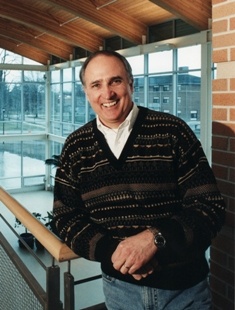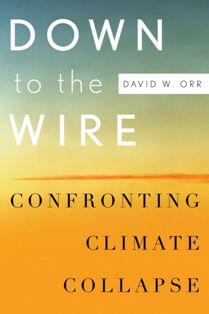We have much more to do and your continued support is needed now more than ever.
Confronting Climate Collapse: The Work of a Lifetime

It is telling that in 1988, before the first proceedings of the Intergovernmental Panel on Climate Change (IPCC) were published and climate change began to emerge in the media as an issue of public concern, Orr convened the first conference ever on the role of the banking industry in minimizing climate effects and advancing self-interest by avoiding loans for inefficient energy projects. It would be difficult to identify another author on the modern dilemma of climate change who has studied the issue more deeply, taught more patiently, or worked harder to apply the lessons learned than Dr. Orr.
His latest effort helps us map where we are now, identify our blinders, and discern the best options for the future. Scientists have identified humans and our penchant for burning fossil fuels as the biggest driver of climate destabilization amidst the complex interplay of variables that influence the habitability of earth. Orr, similarly, helps us isolate the most important questions amidst the din of information about the climate and the human prospect for survival, illustrating how we can better address a number of other social priorities by focusing the policy agenda on energy and climate. “Adoption of a robust energy policy,” he posits, “is the fastest and cheapest way to improve the economy, environment, health, and equity and increase security.”
Readers looking for purely technological fixes or who imagine that a series of small shifts will match the scale of the challenge, are encouraged, in an entertaining style, to re-evaluate key trend lines and revisit criteria for effective policy, educational, and design options. “Realistic hope,” writes Orr, “requires us to check our optimism at the door and enter the future without illusion.”

As in his previous books and essays, Orr’s insights come through the work he’s done: in the last three decades, he’s been a pioneer in local community initiatives such as localizing food and other purchasing and designing buildings that define what is meant by “green.” The latest effort at Oberlin, described in Down to the Wire, aims to eliminate greenhouse gas pollutants and addresses all facets of the Oberlin community in its larger ecological context, from forests and wildlife to renewable energy and agriculture. Each new book by Dr. Orr, thus, is also an illuminating new chapter in the application of ideas about social, economic and environmental sustainability, providing powerful precedents that inspire local change efforts all across the US and beyond.





















